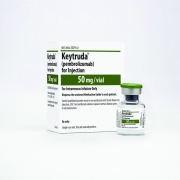Two-year follow-up data were reported from the Phase III CheckMate -9ER trial of Bristol Myers Squibb’s checkpoint inhibitor Opdivo (nivolumab) and Exelixis’ Cabometyx (cabozantinib) in the first-line treatment of advanced renal cell carcinoma.
The U.S. Food and Drug Administration approved Merck’s Keytruda in combination with trastuzumab, fluoropyrimidine- and platinum-containing chemotherapy for the first-line treatment of patients with locally advanced unresectable or metastatic HER2-positive gastric or gastroesophageal junction adenocarcinoma. Keytruda is the first anti-PD-1 therapy approved in combination with anti-HER2 therapy and chemotherapy as a first-line treatment for these patients.
FDA Approves Opdivo-Cabometyx Combo for Advanced Renal Cell Carcinoma
Advanced Renal Cell Carcinoma (RCC), Approvals, Blockbusters, Bristol Myers Squibb, Clinical Trials, Combination Therapies, FDA, First-Line Treatment, Metastatic Renal Cell Carcinoma (mRCC), R&D, Real-Time Oncology Review (RTOR) Pilot, TherapeuticsBristol Myers Squibb’s Opdivo (nivolumab) 240 mg (injection for intravenous use) every two weeks or 480 mg every four weeks in combination with Cabometyx (cabozantinib) 40 mg once daily tablets was approved by the U.S. Food and Drug Administration for the first-line treatment of patients with advanced renal cell carcinoma.
The U.S. drug regulator declined to approve a combination of Merck & Co. Inc.’s blockbuster cancer drug Keytruda and Eisai Co. Ltd.’s Lenvima as the first line of treatment in patients with liver cancer.



